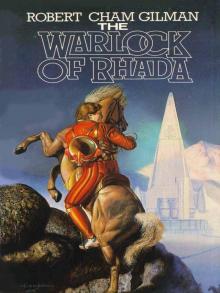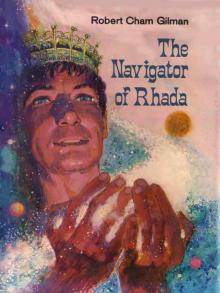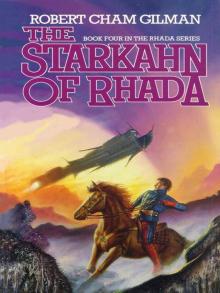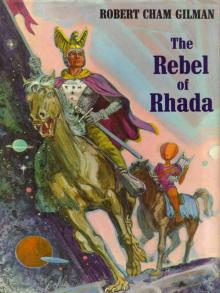- Home
- Robert Cham Gilman
The Navigator of Rhada
The Navigator of Rhada Read online
THE NAVIGATOR OF RHADA
Robert Cham Gilman
The third book in the Rhada series
For The Spook, with love
Copyright © 1969 by Robert Cham Gilman
All rights reserved.
First Edition published by Harcourt, Brace World, Inc.
Library of Congress Catalog Card Number: 69-13774
1
In the last years of the Vykan Dynasty, Torquas the Poet reigned at Nyor. Power was divided among the Imperium, the star kings, and the Order Militant. The Second Stellar Empire stood at a crossroad of history. The forces of enlightenment, home rule, and stirring democracy faced the power of a great general. The danger was interstellar nuclear war. In the idiom of the age it was said that “sin has returned to test us.” To the men of Vykan times the greatest sin was science.
Varus Milenis, The New Renaissance
late Second Stellar Empire period
To study, to learn, to safeguard that which is holy--and above all, to dare: that is the way of a Navigator.
Attributed to Emeric of Rhada, Grand Master of Navigators
early Second Stellar Empire period
For many hours Kynan the Navigator had ridden the mare along the sea-cliff trail, and the animal, a hack rented in Gonlanburg, was tired, cross, and complaining. The rain that fell steadily from the darkly overcast sky sluiced off Kynan’s skullcap and turned his clericals into a sodden ruin. He was thinking now that he should have hired an electric and chanced the batteries lasting the fifty kilometers to Melissande.
But it was too late now. The mare’s clawed pads slipped and trembled on the rocky track, and from time to time she would turn her head to regard her rider reproachfully and ask, “Rest now, rider?”
Kynan, like all Rhads, had a great affection and sympathy for animals, and it sorrowed him to work the old hack so hard, but he could still hear the sounds of pursuit, so he had no option but to tell the mare that she could rest when they reached Melissande and urge her to greater speed.
The path had begun to rise into the basalt palisades of the Stoneland Peninsula. The Navigator had not traveled this track for many years, but he knew the way. As a child he had played here on the cliffs, stealing gulls’ eggs and fishing in the surf of the Gonlan Sea. That was fifteen years ago: before Kreon sent him off to the Theocracy.
The mare stumbled and would have fallen, but Kynan’s old skill on horseback returned, and he caught her head and guided her toward the center of the track.
He turned to look behind him, and he could see the two riders trailing him, cantering across a hard strand of beach below. They were warmen, Rhad by their harness, armed with electric flails and short lances.
There were still robbers in these parts, though why they should follow a Navigator was a mystery. Members of the Order were supposedly sacrosanct everywhere in the
Empire; no Navigator carried anything of value but his microtapes and weapon. And for a layman to be caught with a Navigator’s pistol in his possession meant instant arrest by the civil authorities of any world, no matter how backward.
What seemed most likely was that the two were AbasNavs, followers of the anticlerical party: professional killers of priests.
Ordinarily, no anticlericals would dare trespass on the personal land holding of the devout Kreon of Gonlan. But times, apparently, had changed.
What would Melissande be without Kreon? Star king of the Gonlani-Rhad, Kreon ruled all of Gonlan from the sea to the Arl Mountains and commanded a levy of twenty thousand warmen in the forces of the Rhadan Palatinate. Yet for all his power, the warleader was a good man-- kind to Kynan, in any case. What other noble would make himself bond-father to a homeless warman’s orphan and send him off-world to learn the way of a Navigator, a consecrated First Pilot? Kreon had done that. And each year, at selection time, and on Kynan’s saint-day, there had been a pouch with offering money and a letter. Kynan had them all, those letters. During the hard first years of his novitiate, and later, serving on starships parsecs from home, Kreon’s messages reminded him that he was a Rhad and bond-son of a warleader.
Now they said that Kreon of Melissande was dying. If it was true, it would be a sad homecoming.
He wished that he could get more speed from the mare, but she was doing her best--and said so, grumbling breathlessly. Kynan found himself comparing Gonlan unfavorably with the other planets he had known. It was disloyal, but his urgency forced the comparison. On Gonlan there were no coal or petroleum deposits at all. The forests were too young. The only power source was the hundreds of leaping mountain rivers and the electric generating stations that dotted the single continent. There were electric hover- cars in the towns, but for a long journey across the rugged hunting lands surrounding Melissande, only horses served --Rhadan horses, with clawed fighting feet and military bad temper.
Kynan once again turned his attention to the mounted men behind him. They had turned from the path to take another that led to the plateau, and for a moment Kynan thought that they might be abandoning the pursuit. There was no reason, after all, to assume that they were AbasNav partisans. They might simply be poachers. Then the Navigator realized that they were more sturdily mounted than he. If they chose, they could gallop across the plateau and cut him off from Melissande.
He wondered if he was overdramatizing his situation. A succession of Navigator superiors had told him that he was a young man with a highly developed imagination. He had done many a penance in the last fifteen years for a tendency to play-act.
Still, the men had followed him from the spaceport, and it was a time of unrest. Navigators had been harassed by Imperial agents; some had even been arrested. Torquas XIII, the Galacton on far-off Earth, was said to fear that the Order of Navigators had grown too strong, too much a state within a state. The beatified Emeric, of blessed memory, had foreseen that a time of conflict between the Empire and the Order might come. At the thought of the noble Rhad Grand Master, dead now these three hundred years, Kynan made the sign of the Star and murmured an Ave Stella. Though not yet canonized, Emeric of Rhada was regarded as a patron saint by all the Rhad.
Until the time of Mariana’s rebellion in the first century of the Second Stellar Empire, the Rhad had been regarded as Rim barbarians. But with the marriage of Kier, the Rhad star king, to Ariane, the Regent and Princess Royal, the Rhadan Palatinate had increased in power and influence. And the Rhad clergy, the Navigators from the Ten Worlds, had lately been leaders in the fight for new freedoms.
Kynan, young and only just ordained First Pilot, was hardly worth a political murder on this lonely stretch of cliff. But he was a Rhad, bond-son of a warleader to Alberic, the present star king of Rhada. It would be best to take care.
The young cleric’s hand sought the corded hilt of his pistol, and the solid reality of the weapon brought a grim comfort. This, at least, was simple and elemental. If one were attacked, one fought. And a fight meant either victory and survival or death and paradise. He had already fought on many worlds, in jungles where ancient colonies had reverted to savagery, in deserts where nomads had abandoned the old religion and set up new and blasphemous gods. It was all part of the way of the Navigator.
Like fragments of colored glass in a kaleidoscope, the events of the last weeks flashed through Kynan’s mind.
He saw again the saddened face of the novice who brought the superior’s message into the control room of the Lyri starship Kynan had been commanding. “Kreon, your bond-father, is dying at Melissande--”
And Brother Evart, who like many young clerics, had an adolescent tendency to repeat rumors, had added, “It’s said Kreon was poisoned on Aurora--at the betrothal banquet of Karston and the Aurori heiress. Your bon
d- brother has been captured by the Aurori, and the Lady Janessa is hostage for him at Melissande.”
Kynan thought of his proud adoptive brother Karston possibly in chains somewhere, and Janessa in the cells at Melissande. He remembered her only as a coltish green- eyed girl playing at soldiering in the stone rooms and corridors and among the trees in the gardens of Star Field, the Elector’s residence on Aurora. But the memories were flawed with rumors of treachery and the betrayal of ancient friendships.
It all had an unreal and dreamlike quality to Kynan. Perhaps he had been cloistered too long, too far away from the political maneuverings of the Rim.
The mare raised her head and gave a warning. Ahead, in a narrow notch in the cliffs, she had seen the pursuers’ mounts. She had been a war mare in her youth, and now she bared her teeth and said, “Rider, we fight--fight soon.” The animals knew before men when a fight was coming. They sensed their riders’ intentions and emotions before men did themselves. For five thousand years, since the men of the First Empire colonized the Rhadan worlds, Rhad horses had been bred for war.
The Navigator decided not to run a gauntlet. The narrow shelving track suited him better than it would suit them as a battleground. It would at least force them to fight dismounted and give up the advantage of their fresh animals. He spoke gently to the mare to quiet her and dismounted. Then he took his pistol from under his arm and cleared the cumbersome mechanism that put the weapon into readiness. The short sword sheathed across his back he loosened in its leather case.
There was little else he could do in the way of preparing. If they really meant to fight him, they must come soon, for the light was going fast. To fight in darkness in this rain, on a ledge high above the sea, seemed a thing no out-world pair of warmen would do.
The mare nuzzled at him and nipped nervously with her sharp teeth. The hairs around her velvety nostrils were gray, but she was still trembling with the prospect of an engagement. “Fight,” she breathed. “We fight.”
“No,” Kynan said. “Not you.”
The animal’s claws scraped the rocks. She was almost too tired to stand, but the anticipation of battle was upon her. “Fight,” she said again.
“No,” Kynan said sharply. “You go to Melissande. To the place above the sea. Tell them Kynan fights here--” He repeated his name carefully. “Kynan. Do you understand?”
“Ky-nan,” the mare said.
“Go now.” He turned her head back the way they had come and slapped her gently on the rump. The old animal stumbled away down the track toward the place where the high path crossed it. Once she paused and looked back, but Kynan said, “Go!” and she ambled off, head down and flanks heaving with weariness.
Moving purposefully, Kynan retreated to the very edge of the rock shelf. Underfoot, the mossy ground was slick with rain. A hundred meters below, white and frothing in the wet dusk, could be heard the long, rolling surf of Gonlan’s northern sea. From this point of land to the ice barrier, ten thousand kilometers to the north, no island or rock broke the surface of the dark ocean.
The wind was rising now, driving the cold rain like a lash and whipping the Navigator’s cloak. He unclasped the sodden cloth and wound it about his forearm. Small protection against the flash of an electric flail--but if the highwaymen should ever come that near, all would be lost in any case.
Kynan thought of his bond-father at Melissande, and of his bond-brother, the proud one, a prisoner in some unknown keep. Even if the galactic spirit of the holy Star did not demand it, he promised he would fight to survive-- and to avenge whatever offenses had been committed on Aurora against his family. He made the sign of the Star and recited the Prayer before Battle.
Then he drew his pistol, primed it, and waited.
2
Unhallowed, knowledge brought the Dark Time, and fire from, the sky, and death to men in ten times a thousand dreadful ways. So I say this to you: Seek not to know, for to know is to sin. Ask not how, nor how much, nor how many. He who disturbs the mysterious ways of the Universe is heretic, an enemy of God and Man. And he will burn.
Talvas Hu Chien, Grand Inquisitor of Navigators
Interregnal period
I sought the knowledge of the atom. That I failed is my salvation. I recant all heresy and return in peace to the bosom of the Order.
Navigator Anselm Styr’s confession on the scaffold at Biblios Brittanis, Mars
early Second Stellar Empire period
Three hundred years ago we burned researchers. Today we are on the verge of synthesizing plutonium. What might we not accomplish tomorrow--if there is peace?
Sal ben Yamasaki, Grand Master of Navigators to the Curia of Algol
middle Second Stellar Empire period
The starship in synchronous orbit a thousand kilometers above the surface of Gonlan was of ancient design. Like most of the other great interstellar craft in the known galaxy, it had been built more than four thousand Galactic Standard Years earlier--in the time of the First Empire.
It was a huge vessel, as large as a small planetoid, and though only a dozen men were presently aboard her, she had been built to carry five full divisions of Imperial troops.
On her prow was emblazoned the spaceship and star of the First Empire, an insignia that the Theocracy of the Navigators had made their own. Within her kilometer- long hull, no man tended her powerful, eternal engines. Even the scientists of the Order had not yet solved the riddle of the power that had, for five millennia, driven this ship and a few thousand others back and forth across the galaxy at speeds that her present users were still unwilling to credit.
In the civilization of the Second Empire, the starships were the responsibility of the Order, and only the Order. Navigators trained in the Theocracy of Algol served every noble, every warleader in the galaxy--even the Galacton himself.
As late as a generation ago, the great starships had been lit within by torches, and their flight range had been limited by the slow fouling of the air within the hulls. But now the ancient life-support systems had been reactivated, the exterior scanning beams repaired. The holy Navigators, after three hundred centuries of study, retreat, inquisition, and devotions without end, were beginning to understand the miraculous machines bequeathed to them by the scientists of the Golden Age.
In the control room of the great ship, five cowled figures sat before the consoles. The bulkheads of the domed chamber were energized and transparent, so that the men and their machines seemed to float in open space against the cloud-girt disk of the planet below.
All wore the spaceship and star of the Theocracy. These were the Five: princes of the Order and controllers of the Navigators’ galaxy-spanning intelligence apparatus.
The original Five had been assembled in the time of Torquas X (called the Heretic), the first Vykan Galacton to persecute the clergy. In times of danger to the Order, they commanded vast powers. Yet such was their knowledge that they, better than any men alive in this fourth century of the Second Stellar Empire, knew how many greater powers prowled the galaxy.
A tone sounded.
“Sensor beam locked on,” the Technician reported.
Panels lighted before the five Navigators. Tiny three-dimensional figures moved along a path above a crashing surf. A tiny Rhadan mare shambled along a path to the sea.
“They’ve found him again,” the Logician commented.
The Tactician said coldly, “If they take him, the game is over. Suggest we intervene.”
“Negative,” the Logician said sharply. “Our scanning area is limited. We can’t tell who is in sight of that promontory. It could be anyone.”
“Or no one,” the Tactician grunted. The Technician made an adjustment on his instruments, and the brightness of the tiny holographs increased. “We can’t intervene without killing him--and blasting Gonlanburg and half the peninsula into gas.”
“Suggest we consider just that,” the Tactician said. “From the military point of view it would be justified. We still have the girl
as a contact. We could activate the alternate plan.”
The Theologian, least influential of the Five, said, “We are not justified in taking such action. May the God of Stars forgive you for even considering it.”
The Tactician persisted. “We can’t help him. Our weapons are too powerful and nonselective. And we cannot allow him to be taken. He is a nexus.”
The Logician intervened. “If they had taken the girl, I would agree. That was what we foresaw when we had her implanted. But they didn’t. She’s in the cells at Melissande. A warhead would probably kill her, too.”
The Tactician displayed a soldier’s impatience. “The plan was always doubtful from the military point of view. We would do better to sterilize the area and begin again.” The last member of the group to speak was the Psychologist. Among his other duties was the coordination of the Five’s activities. His voice was sonorous and persuasive. “The plan was never conceived as a military operation. Even the Order Militant can’t face the Empire on those terms--and it should not even try. You are too much the soldier, Tactician. Humanitarian considerations aside, a nuclear blast would bring the Imperials down on Gonlan and Rhada in force. We could never run the full course then. Not for another fifty years, perhaps more. The Galacton--”
“--is a fool,” the Tactician said roughly.
“Precisely. We have waited three generations for this chance. In fifty years we may have another Glamiss Magnifico on the throne. We cannot risk too obvious a move now. Besides, I helped train the boy. He has powers he doesn’t dream of. Let the plan operate.”
“They are moving in on him,” the Technician said.
“Pity the lad,” the Theologian murmured. “Pray for him.”
“You pray for him,” the Tactician said grimly. “I’ll just watch him die--and the plan with him--because people like you send men out armed with museum pieces.” The irritation in his voice increased as he watched the tiny figure in his screen shielding his cumbersome flintlock weapon from the rain. “We could arm our people so that no one in the galaxy would dare touch them--and we pretend that is the best we can do.”

 The Warlock of Rhada
The Warlock of Rhada The Navigator of Rhada
The Navigator of Rhada The Starkahn of Rhada
The Starkahn of Rhada The Rebel of Rhada
The Rebel of Rhada